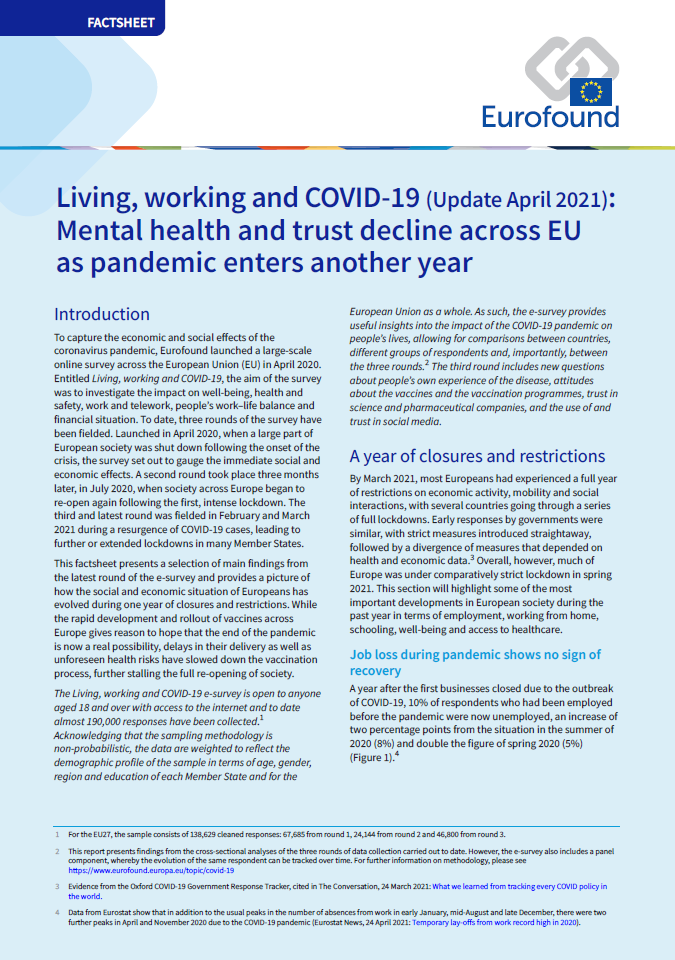
Cea de-a treia rundă a sondajului electronic al Eurofound, desfășurată în februarie și martie 2021, scoate la lumină situația socială și economică a oamenilor din întreaga Europă, după aproape un an întreg de viață cu restricții cauzate de pandemia de COVID-19. Prezentul raport analizează principalele concluzii și urmărește evoluțiile și tendințele actuale din cele 27 de state membre ale UE, de la lansarea sondajului în aprilie 2020. Raportul identifică problemele care au apărut în cursul pandemiei, cum ar fi nesiguranța mai mare a locurilor de muncă din cauza amenințării cu disponibilizarea, degradarea bunăstării psihice, erodarea recentelor câștiguri în ceea ce privește egalitatea de gen, scăderea încrederii în instituții, deteriorarea echilibrului dintre viața profesională și viața personală și creșterea reticenței față de vaccinare. Rezultatele sondajului evidențiază necesitatea unei abordări holistice pentru a sprijini toate categoriile puternic afectate de criză pentru ca acestea să nu rămână în urmă.
Key findings
Bunăstarea psihică a atins cel mai scăzut nivel la toate grupele de vârstă de la începutul pandemiei în urmă cu peste un an. Această situație este deosebit de evidentă în rândul tinerilor și celor care și-au pierdut locul de muncă.
Inegalitățile existente se extind din cauza impactului disproporționat al pandemiei asupra categoriilor vulnerabile. Rezultatele arată că dificultățile de a face față cheltuielilor cresc semnificativ în rândul celor care se află deja într-o situație precară.
Satisfacția cetățenilor față de măsurile de sprijin pentru combaterea crizei a scăzut dramatic, doar 12 % considerând că măsurile de sprijin sunt corecte, în scădere față de 22 % în vara anului 2020. Procentul celor care au considerat că obținerea sprijinului a fost ușoară și eficientă a scăzut, de asemenea, de la 16 % în vara 2020 la 10 % în primăvara anului 2021. Pentru aproape un respondent din zece, cererea de sprijin financiar a fost respinsă.
Încrederea în instituții a scăzut dramatic, îndeosebi încrederea în guvernele naționale, care a scăzut de la 4,6 în vara anului 2020 la 3,9 în primăvara anului 2021. Încrederea în guvernele naționale din toate statele membre a scăzut sub nivelurile înregistrate la începutul pandemiei. Încrederea în UE a scăzut, de asemenea, dar rămâne mai mare decât încrederea în guvernele naționale.
Peste un sfert din persoanele care trăiesc în Europa indică o reticență față de vaccinarea împotriva COVID-19, bărbații arătându-se mai reticenți (29 %) decât femeile (25 %). Reticența față de vaccinare este asociată puternic și cu un nivel scăzut de încredere și cu utilizarea platformelor de comunicare socială, țările care prezintă niveluri scăzute de încredere în guvern înregistrând niveluri mai ridicate de reticență față de vaccinare.
Explore the dataset for each round of the survey.
The data cover a range of topics under seven main headings: quality of life, democracy and trust, work and teleworking, the financial situation and security of respondents, the quality of public services, the employment support measures put in place, as well as the willingness of Europeans to be vaccinated during COVID-19.
- Data: Quality of life during COVID-19
- Data: Democracy and trust during COVID-19 (new in round 3)
- Data: Working during COVID-19
- Data: Financial situation and security during COVID-19
- Data: Quality of public services during COVID-19
- Data: Support measures during COVID-19 (new in round 3)
- Data: Vaccinations during COVID-19 (new in round 3)
The report contains the following lists of tables and figures. The corresponding data for the tables and figures is available as an Excel download (328KB .xlsx).
List of tables
- Table 1: Location of work and average hours worked during the pandemic, EU27 (%)
- Table 2: Proportion of parents declaring they are too tired after work to do household jobs, EU27 (%)
- Table 3: Proportion of respondents reporting having negative feelings by age and gender, EU27 (%)
- Table 4: Request for support by employment status, EU27 (%)
- Table 5: Proportion of financially fragile respondents by employment status, EU27 (%)
- Table 6: Proportion of respondents reporting difficulties making ends meet by employment status, EU27 (%)
- Table 7: Proportion of respondents reporting arrears by group, EU27 (%)
- Table 8: Trust in the EU by sociodemographic group (mean scores), EU27 (%)
- Table 9: Trust in the national government and the EU by financial support (mean scores), EU27 (%)
List of figures
- Figure 1: Respondents who lost their job (of those who were employed before the pandemic) by country, EU27 (%)
- Figure 2: Preference to work from home post-pandemic, EU27 (%)
- Figure 3: Proportion of parents declaring they would like more online schooling for their children, even when the pandemic is over, EU27 (%)
- Figure 4: Risk of depression by age group and survey round, EU27 (%)
- Figure 5: Unmet need for healthcare during the pandemic by country, EU27 (%)
- Figure 6: Unmet need for healthcare by type of healthcare, spring 2021, EU27 (%)
- Figure 7: Requests for different types of support measures, summer 2020 and spring 2021, EU27 (%)
- Figure 8: Views about pandemic support measures, summer 2020 and spring 2021, EU27 (%)
- Figure 9: Views about pandemic support measures by country, spring 2021, EU27 (%)
- Figure 10: Proportion of respondents reporting difficulties making ends meet by country, EU27 (%)
- Figure 11: Pessimism about financial situation by economic situation, EU27 (%)
- Figure 12: Proportion of respondents stating that their financial situation will get worse, EU27 (%)
- Figure 13: Trust in institutions (mean scores), EU27 (%)
- Figure 14: Trust in the EU by country (mean scores), EU27 (%)
- Figure 15: Trust in national governments by country and survey round, EU27 (%)
- Figure 16: Stated intention to take vaccine by country, EU27 (%)
- Figure 17: Sociodemographic characteristics of people with vaccine hesitancy in Europe, EU27 (%)
- Figure 18: Reasons for vaccine hesitancy, EU27 (%)
- Figure 19: Trust in institutions among people who are vaccine hesitant and non-hesitant, EU27 (%)
- Figure 20: Vaccination hesitancy before and after 11 March 2021, EU27 (%)
- Infographic: Living, working and COVID-19
